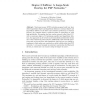Free Online Productivity Tools
i2Speak
i2Symbol
i2OCR
iTex2Img
iWeb2Print
iWeb2Shot
i2Type
iPdf2Split
iPdf2Merge
i2Bopomofo
i2Arabic
i2Style
i2Image
i2PDF
iLatex2Rtf
Sci2ools
116
click to vote
OPODIS
2008
2008
Degree 3 Suffices: A Large-Scale Overlay for P2P Networks
Most peer-to-peer (P2P) networks proposed until now have either logarithmic degree and logarithmic dilation or constant degree and logarithmic dilation. In the latter case (which is optimal up to constant factors), the constant degree is achieved either in expectation or with high probability. We propose the first overlay network, called SkewCCC, with a maximum degree of 3 (minimum possible) and logarithmic dilation. Our approach can be viewed as a decentralized and distorted version of a Cube Connected Cycles network. Additionally, basic network operations such as join and leave take logarithmic time and are very simple to implement, which makes our construction viable in fields other than P2P networks. A very good example is scatternet construction for Bluetooth devices, in which case it is crucial to keep the degree at most 7.
Constant Degree | Distributed And Parallel Computing | Logarithmic Degree | Logarithmic Dilation | OPODIS 2008 |
| Added | 30 Oct 2010 |
| Updated | 30 Oct 2010 |
| Type | Conference |
| Year | 2008 |
| Where | OPODIS |
| Authors | Marcin Bienkowski, André Brinkmann, Miroslaw Korzeniowski |
Comments (0)

